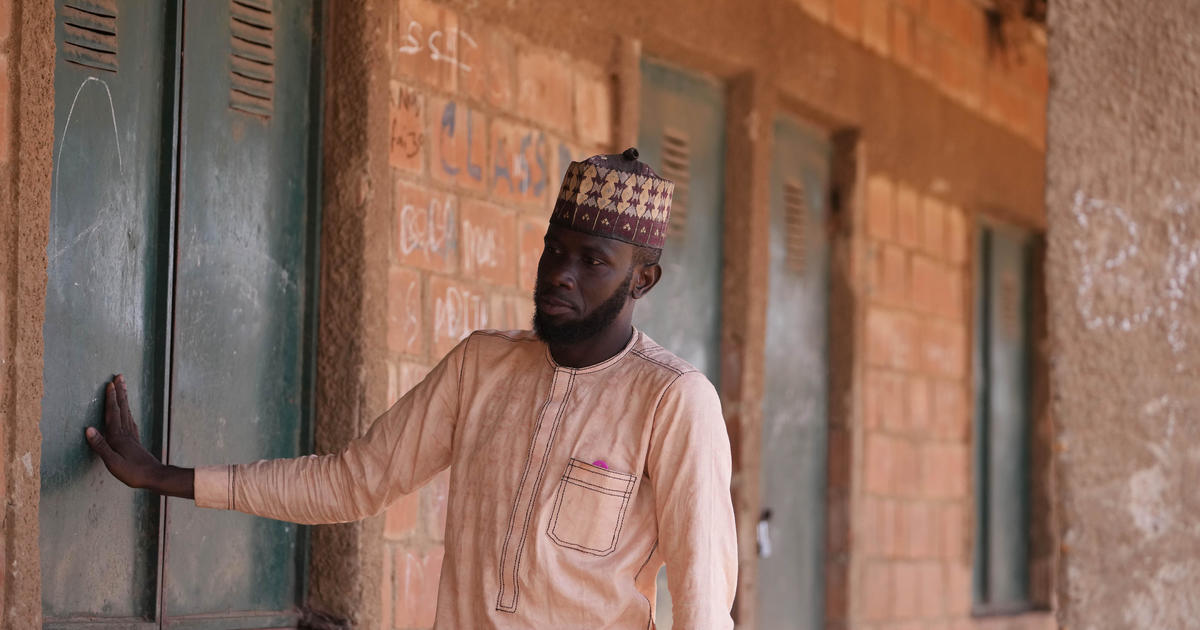CBS News
Nigeria hit by another mass kidnapping, with more than 300 now believed missing

Kaduna, Nigeria — Gunmen have abducted dozens of people from a northwest Nigerian village, according to two local representatives and a United Nations source, just days after the kidnapping of more than 250 pupils from a school in the same state.
CBS News correspondent Debora Patta says armed groups, known locally as bandits, have wreaked havoc for years in northern Nigeria, where they target villagers, motorists on highways and students in schools, hoping to barter for ransom payments. The latest attack took place around midnight, with gunmen firing sporadically to scare residents in Kaduna state’s Kaiuri district.
It follows a similar pattern seen over the last couple weeks in remote communities across northern Nigeria, where there is little security and residents have been left feeling helpless.
Sunday Alamba/AP
The spate of recent abductions drew a warning from a regional security expert, who told CBS News’ producer Sarah Carter over the weekend that Nigerian security forces appeared to have lost control of the country.
Tuesday’s abductions in Kaiuri came as security forces searched for the pupils who were kidnapped last week from their school in Kuriga village, about 93 miles away in the same state. Before that, gunmen abducted another group of children early Saturday morning from a school in Sokoto, another state in northwest Nigeria.
Saturday’s was a smaller kidnapping, with about 15 children said to be missing, but it was the third incident reported in just a week following reports that as many as 300 internally displaced people had gone missing near a camp in the northeast state of Borno. The security expert, David Otto, told CBS News many of those individuals likely were not abducted, but rather chose to leave the grim situation in their IDP camp and return to the bush and, in many cases, to relatives aligned with the terror group Boko Haram.
The mass kidnappings come almost 10 years after Boko Haram militants triggered a huge international outcry in 2014 by abducting more than 250 schoolgirls from Chibok in Borno state. About 100 of them remain missing.
The series of large-scale abductions is challenging President Bola Ahmed Tinubu’s government, which promised to tackle insecurity while also managing a cost-of-living crisis and bringing more investment to Africa’s most populous nation.
Nigerian officials have not provided information on the Tuesday abductions in Kaiuru, but local councillor Abubakar Buda told Channels TV that gunmen stormed the village early in the morning, going house-to-house to kidnap residents and opening fire sporadically. Buda said a military intervention stopped more people from being kidnapped, according to Channels.
State lawmaker Usman Danlami Stingo told Arise News that 32 women and 29 men had been snatched.
A U.N. source, who was not authorized to speak publicly to the media, also told AFP that gunmen stormed the village early Tuesday morning and that “around 60” people were taken.
Former Nigerian Senator Shehu Sani told CBS News on Wednesday that the bandits would likely split up the people they seized to avoid drone detection while they negotiate with the government for ransom payments.
Nigeria’s criminal gangs know the families themselves don’t have money to pay for their loved ones’ return, but they’ve made a lucrative business out of abducting people for ransom anyway.
Kidnapping is illegal in Nigeria and carries a possible life sentence, but so is paying kidnappers ransom — officially, at least. Sani said the government would likely pay the ransom but not disclose any details of the negotiations or any payment made.
The gangs use ransom money to buy more weapons and expand their areas of operation.
AFPTV/AFP via Getty Images
Troops were still scouring forests in the northwest, meanwhile, in an effort to rescue the students kidnapped last week from Kuriga, but families have said they’ve been given little information since the abductions.
“We will continue praying for divine help in resolving this tragedy while the government takes up the issue with the kidnappers,” relative Muhammad Kabir told AFP on Wednesday.
On Tuesday, inspector-general of the national police force Kayode Egbetokun vowed to deploy officers across the state to “allay fears and build confidence of Kaduna residents, especially those in rural communities.”
CBS News
Paris Hilton’s fight against youth treatment center abuse leads to Congressional action

Watch CBS News
Be the first to know
Get browser notifications for breaking news, live events, and exclusive reporting.
CBS News
Drug trade in Syria allegedly tied to Assad regime’s financial gains

Watch CBS News
Be the first to know
Get browser notifications for breaking news, live events, and exclusive reporting.
CBS News
Congress veers toward government shutdown after GOP revolt led by Trump, Musk

Washington — Congress’ path forward on government funding is in limbo after House Republicans, with the support of Elon Musk and President-elect Donald Trump, torpedoed an initial deal to avert a shutdown before a Friday night deadline.
The House descended into chaos Wednesday when the GOP revolt sank a last-minute funding measure to keep the government operating through early next year.
The massive end-of-year spending legislation immediately sparked anger from conservatives when it was unveiled late Tuesday. Texas GOP Rep. Chip Roy referred to it on X as a “1,547-page Christmas tree,” while Rep. Kat Cammack, a Florida Republican, called it “a band-aid that is laced with fentanyl.”
The more than 1,500-page bill released Tuesday was far from a modest stopgap measure. In addition to extending government funding through March 14, it included disaster aid, health care policy extenders and a pay raise for members of Congress, among other provisions. The disaster relief portion of the bill came with a $110 billion price tag.
Elon Musk, the co-head of Trump’s advisory Department of Government Efficiency chimed in with a barrage of posts Wednesday calling the bill “criminal” and suggestions that Republicans who supported it did not belong in Congress. And the opposition culminated in statements from Trump lambasting the new spending and threatening a primary challenge against any Republican supporting the measure.
The president-elect called on Republicans to strip out the additional spending and added a new element instead — raising the debt ceiling. The debt ceiling, which limits how much the government can borrow to pay its bills, is suspended until the first quarter of next year, but Trump said he’d prefer to force President Biden to approve raising the debt ceiling so he wouldn’t have to sign it.
“I will fight ’till the end,” Trump wrote.
Top House Republicans met Wednesday night after the initial deal fell apart, but a new path forward remained unclear Thursday morning as Congress lurched toward Friday night’s deadline to fund the government.
Though stripping out most of the additional funding would satisfy many Republicans, Johnson is likely to need dozens of votes from Democrats, and some are already slamming Johnson for walking away from the agreement. They argue Republicans will shoulder any blame for a potential shutdown.
“Republicans have now unilaterally decided to break a bipartisan agreement that they made,” House Minority Leader Hakeem Jeffries, a New York Democrat, said Wednesday. “House Republicans will now own any harm that is visited upon the American people that results from a government shutdown or worse.”
Tom Williams/CQ-Roll Call, Inc via Getty Images
Spending fight throws Johnson’s speakership into question
The initial plan to keep the government funded and the chaos that surrounded it also prompted intense criticism of Johnson, including from members of his own party.
In addition to the slew of add-ons to the spending bill, conservatives are angry with Johnson for carrying out the negotiating process largely occurred outside of the view of rank-and-file members. Rep. Eric Burlison, a Missouri Republican, called the process “a total dumpster fire.”
A handful of Republicans indicated their support for Johnson’s speakership in the new Congress is now in question, and with such a narrow majority, it would take only a few to take him down. Rep. Thomas Massie, a Kentucky Republican, said flatly Wednesday that he won’t support Johnson in the speaker’s election.
“I’m not voting for him,” Massie said. “This solidifies it.”
In November, House Republicans backed Johnson to lead for another two years during their leadership elections. But the full chamber will vote to elect a speaker on Jan. 3. During the last speaker fight at the beginning of a new Congress in 2023, the slim Republican majority took 15 rounds to elect former Speaker Kevin McCarthy, who was ousted from the role nine months later, partly due to his handling of government funding.
Still, Johnson generally enjoys more favor than McCarthy with the president-elect, who wields widespread influence over House Republicans. Trump told Fox News Digital on Thursday that Johnson would “easily remain speaker” if he “acts decisively and tough” and eliminates “all of the traps being set by Democrats” in the spending package.










